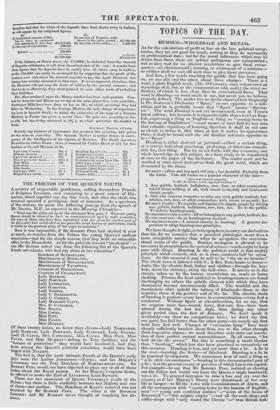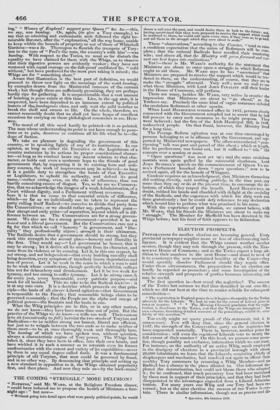TOPICS OF THE DAY.
HUMBUG—WHOLESALE AND RETAIL.
As for the calculations of profit or loss on the late political occur- rences, they are not good for much, resting as they do necessarily on problematical data; but for the moral inferences which may be drawn film them, these are neither ambiguous nor unimportant ; and as they wait for no ulterior revelations to give them conse- quence—no chambermaid's warning, or retirement of a minister— so neither shall we wait till such tune to give them utterance.
And first, a few words touching the gabble that has been going on, on one side and the other, about these changes. There is a word, a plain English word, (Mr. O'CoNrima, once volunteered an etymology of it, but, as the commentators add, male.,) the strict or- thodoxy of which is less clear than its conventional force. That word is Humbug,—a word much in use, but never yet, we believe, properly defined. The reader has no doubt observed how frequently in Dr. JOHNSON'S Dictionary " Spect." occurs opposite to a defi- nition, and he is probably aware that " Spect: means " Specta- tor." The word Humbug is not yet incorporated, even in Ton's latest edition ; but because it is unquestionable that a word so Eng- lish, expressing a thing so English—a thing so "coming home to the bosoms of Englishmen "—must sooner or later find its way into that valuable repository of learning, therefore it shall be our care so clearly to define it, that when at last it makes its appearance there, it shall be found with the old familiar reference opposite to it—" Spect."
humbug is either abstract or personal—either a certain thing, or a certain individual practising, professing, or otherwise remark- able for that thing. But let us set forth, with due ceremony, our whole knowledge on this subject, in a form ready to be transferred at once to the pages of the dictionary. The reader must not be startled at some novel derivatives from the great word, which are demanded by the times.
HUMBUG—(Jlinn and burg apud O'Conn. ; but doubtful. Probably from the Latin. Vide old verses on a popular character of the time- " Quo non otrocior mumum, Verily do think°, terris apparnit hambug.")
I. Any gabble, hubbub, hollabaloo, row, fuss, or other commotion, raised about nothing at all, with intent to mystify and bamboozle simple people.
2. One who raises or conspires to raise any such gabble, hubbub, hol- labaloo, row, fuss, or other commotion, with intent to mystify, &c.
Humnuo (verb)—To mystify and bamboozle simple people by raising any gabble, hubbub, hollabaloo, row, fuss, &c. To do the public. To behave humbugeously.
IIMIBUGEOUS (the G soft)—Of or belonging to any gabble, hubbub, &c. HumnucEousmr—In an humbugeous manner.
HUMBUGEOUSNESS—A. natural alacrity in humbug. A general dis- position to adopt humbugeous principles.
We have thought it right, as lexicographers, to carry our derivatives thus far, for we conceive that a practical philologist never does a more acceptable service than when he recognizes the conversa- tional wants of the public. Besides, neologism is allowed to be necessary in proportion to the spread of science—words ought to keep i pace with Minds. Humbug n the political world is that mighty principle which controls, and, as it were, conducts half its opera tions. At this moment it may be said to be "the air we breathe." The whole town is infected with it ; it flies front house to house— darts, like the electric fluid, hither and thither—through the key- hole, down The chimney, along the bell-wires. It arrests us in the streets, takes us by the button, overwhelms us, sends us home choking. Persons the least, addicted to humbugeousness are found discharging on others the subtile element with which they have themselves become unconsciously filled. The truthful and the mendacious alike uphold the battery of falsehood—those at the negative, these at the positive end of the lie. The electric chain of humbug is perfect—every knave in communication—every fool a conductor. Without figure or circumlocution, let us say, that we suppose more lies—round, lusty, first-rate lies—have been uttered during the last ten days, than during any other given period since the first of January. We don't speak it invidiously—we draw no comparisons here ; we don't say that one party has lied better than the other party—we merely say that both have lied well. Charges of "enormous lying" have been already sufficiently bandied about from one to the other through their respective organs ; we need therefore only state our convic- tion of their perfect mutual reasonableness. By all means, "let both divide the crown." But this is something a shade blacker than " humbug," which has also been practised SO extensively on this occasion. Humbug is less, and yet more than a lie. A lie is the root—humbug the flower—of falsehood. Humbug is a lie in its practical development. We sometimes hear of such a thing as "a lie with circumstances "—humbug is this circumstantial part of a lie ; it is the general county or province of which LIE is the capital. For example—to say that Sir ROBERT PEEL insisted on clearing out the Palace and would not leave the Queen a single handmaid, was a lie. To proceed hereupon to raise a hue and cry over the country as if her Majesty's liberty were threatened, or her very life in danger—to fill the town with Commissioners of Alarm, and all the newspapers with "coming home to the bosoms of English- men "—" young and confiding maiden "—" scion of the house of Brunswick "—" this mighty empire "—and all the cook-shops and coffee-shops with "rally round the Throne "—" true British feel- ing," " Women of England! support your Queen!" &c. &c.—this, we say, was humbug. Or, again, (to give a Tory example,) to say that an admiring and enthusiastic mob followed the right ho- nourable Baronet, after the "explanation," all the way home, unable to keep within the bounds of propriety or out of those of Whitehall Gardens—was a lie. Thereupon to flourish the trumpets of Tory- ism to the tune of "Peel's the man, the country's with him"—was humbug. With respect to the Tories, we must so far disturb the equality we have claimed for them with the Whigs, as to observe that their digestive powers are evidently weaker ; they have not ventured with equal courage on the full-proof undiluted lie, "cold without," but have preferred for the most part taking it mixed ; the Whigs are for "something short." Aware that illustration is the best part of definition, we would proceed to throw new light on the meanings of the word humbug, by examples drawn from the Ministerial rumours of the current week ; but though these are sufficiently promising, they are perhaps hardly ripe for gathering. It is unquestionable that a vast amount of humbug in posse exists at. this time. Lies, in the egg state, it is suspected, have been deposited to an immense extent by political insects of thq.humbugeozis class, and only wait the mild weather to break the shell and swarm to life. On the whole, therefore, we cannot reasonably doubt that we shall yet have heaps of excellent occasions for carrying on these philological researches in you. HUM- BUG.
The moral of all this need hardly be pointed—ft is so pointed. The man whose understanding its point is not keen enough to pene- trate or to pain, deserves to continue all his life what he is—the dupe of faction.
We take no pleasure in degrading the government of this country, or in speaking lightly of any of its institutions. In our opinion, as long as either the Executive or the Legislature of a country maintains by its actions its proper constitutional charac- ter—as long as its conduct bears any decent relation to that cha- racter, or holds out even a moderate hope to the friends of good government that, by supporting it in its existing fbrm and ordi- nary courses, the work of improvement may be achieved—so long it is a public duty to strengthen the hands of that Executive or Legislature, to uphold its authority, and defend its good name,—rather erring, even, on the side of adherence, than too hastily conceiving causes of disgust. Yes, so far are we Conserva- tive, that we acknowledge the dangers of a weak Administration, of a Court without dignity, and a Parliament without reverence. But here it is that we come to that essential article of .difference, which—so far as we individually can be taken to represent the party calling itself Radical—we conceive to divide that party from the Conservatives ; or we should rather say, perhaps, that point— that abrupt and early point—of separation, beyond which all is dif- ference between us. The Conservatives are for a strong. govern- ment. We also are for a strong government—provided it be an honest and a liberal government. But the Conservatives care not a fig for that which we call " honesty" in government, and " libe- rality " they professionally abjure ; strength is their ultimatum. The Radicals desire that a government should be strong, but they rank this strength in the second place—honesty and liberality in the first. They would say—" Let government be honest, that it may be strong ; let it derive all its strength from its character, and none from its violence or its cunning. Let it, in this one respect, be not strong, and not independent—that every budding rascality shall bring desertion, every symptom of treachery insure degradation and loss of power. Let it be weak in the sense in which a man is said to be weak whose constitution, though perfectly healthful, suffices him not for debauchery and drunkenness. Let it be too weak fur tyranny, and too strong to suffer tyranny. Let it be strong enonA for every just, every honourable, every patriotic purpose—and weak for all besides." This we take to be the Radical doctrine ; it is at any rate ours. It is a doctrine which proceeds on that prin- ciple—the basis of all sincere Liberal agitation—that Government is responsible to the People ; that reasonable beings claim to be governed reasonably ; that the People are the alpha and omega of political power—the fountain and the basin in one.
What the Whig principles are in this, or in any other matter, we do not know—they have been some time out of print. But the practice of the Whigs we do know—a trifle too well. Their custom
is to sit (occasionally to fall) betwixt the two stools of Toryism and Radicalism—to be neither strong nor honest, liberal nor efficient,
but just so to wriggle between the two ends as to make neither of them meet—to be at once thoroughly weak and thoroughly base. The humbug of which we have spoken was, without question, always a characteristic engine of Tory power. The Whigs have taken it, since they have been in office, into their own hands, and have wielded it in such a manner as to astonish even its former usufructuaries with the extent and variety of its capabilities—never by them in any equal degree called forth. It was a fundamental principle of old Toryism, that men could be governed by fraud,
and in no other way. By denouncing that principle and setting up a new standard in opposition to it, the Whigs obtained popularity first, and then place. And now they rule us—by the back-stairs!



























 Previous page
Previous page